From Web 2.0 To Web3 - The Way IT Companies See It: Survey Results

Over the past few decades, the internet has undergone significant changes, from static web pages to interactive content and social media platforms. Web 2.0 brought about an era of user-generated content, but now a new paradigm shift is an underway - Web3. IT companies are paying close attention to the emergence of this new era and exploring the possibilities and opportunities that it presents.
Between January 30 - Feb 10, 2023, TechBehemoths conducted a survey among 988 IT companies across 35 countries to find out how IT companies see both the Web3 concept and its adoption on a larger scale.
Survey respondents profile
During the survey, we covered topics such as location, business size, and position held within the company following to measure how respondents’ impressions and opinions change based on these three criteria.
Survey respondents’ position within the company
As per 988 interviewed respondents, representing the same amount of companies, the survey results show that 27% of respondents are IT company CEOs, 8.4% of the respondents are CTOs, and other 2.2% are COO.
At the same time, a total of 20.2% of the respondents hold positions in Sales, Marketing and Business Development, while other 27% are professionals holding other positions within their IT companies.
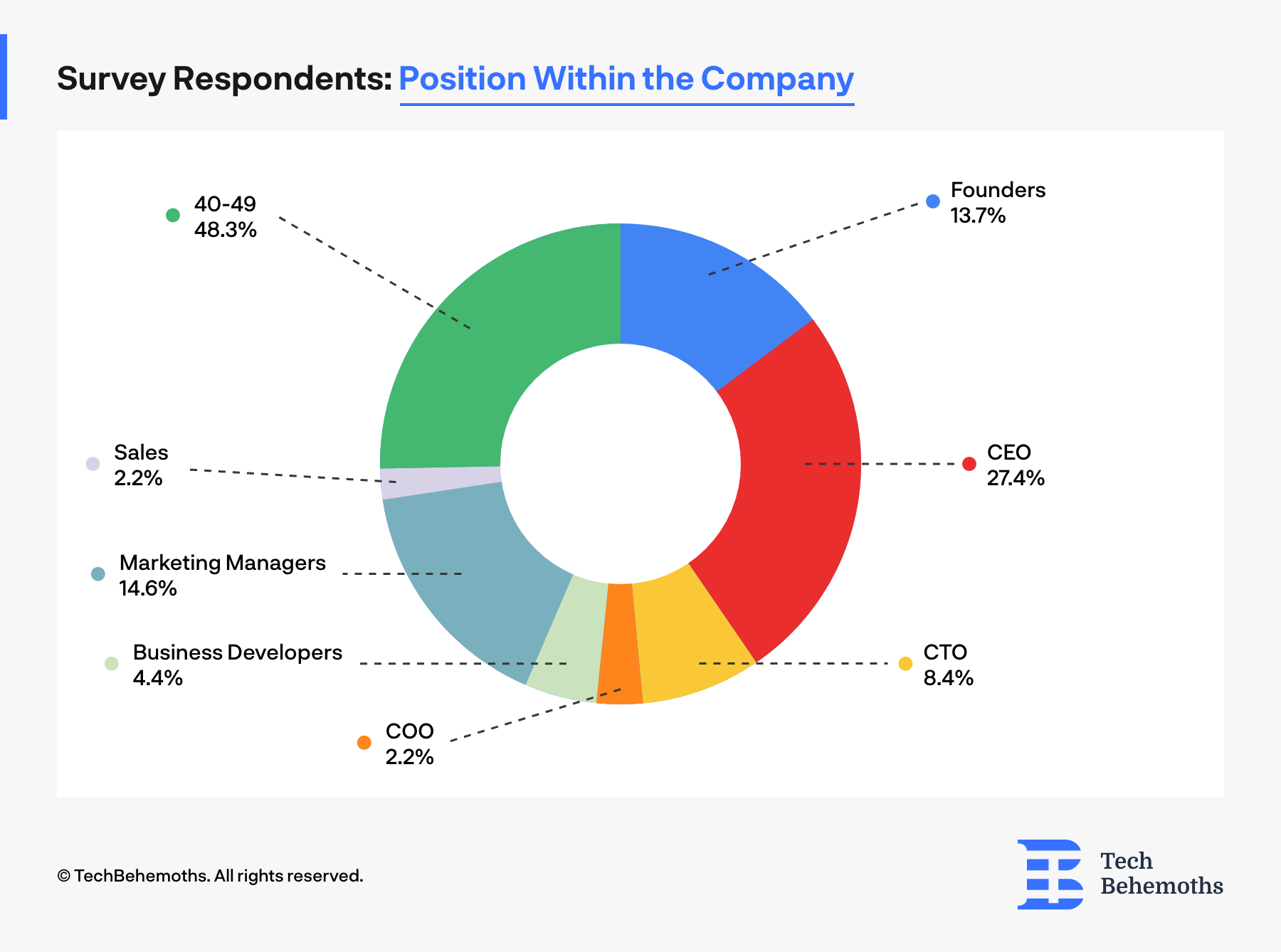
Survey Respondents - Geographical Distribution
As per location, most of the respondents come from companies based or active in the United States, United Kingdom, India, Poland, or Canada among others.
At the same time, 17% of respondents come from Latin American-based companies, and 8% of respondents come from Australian IT companies.
In Europe, most of the survey respondents come from the United Kingdom (7.3%), Poland (6.9%), and Ukraine (6.8%). The profiles of Asiatic respondents are, in their turn lead by a majority of Indian, Pakistani, and Bangladeshi respondents.
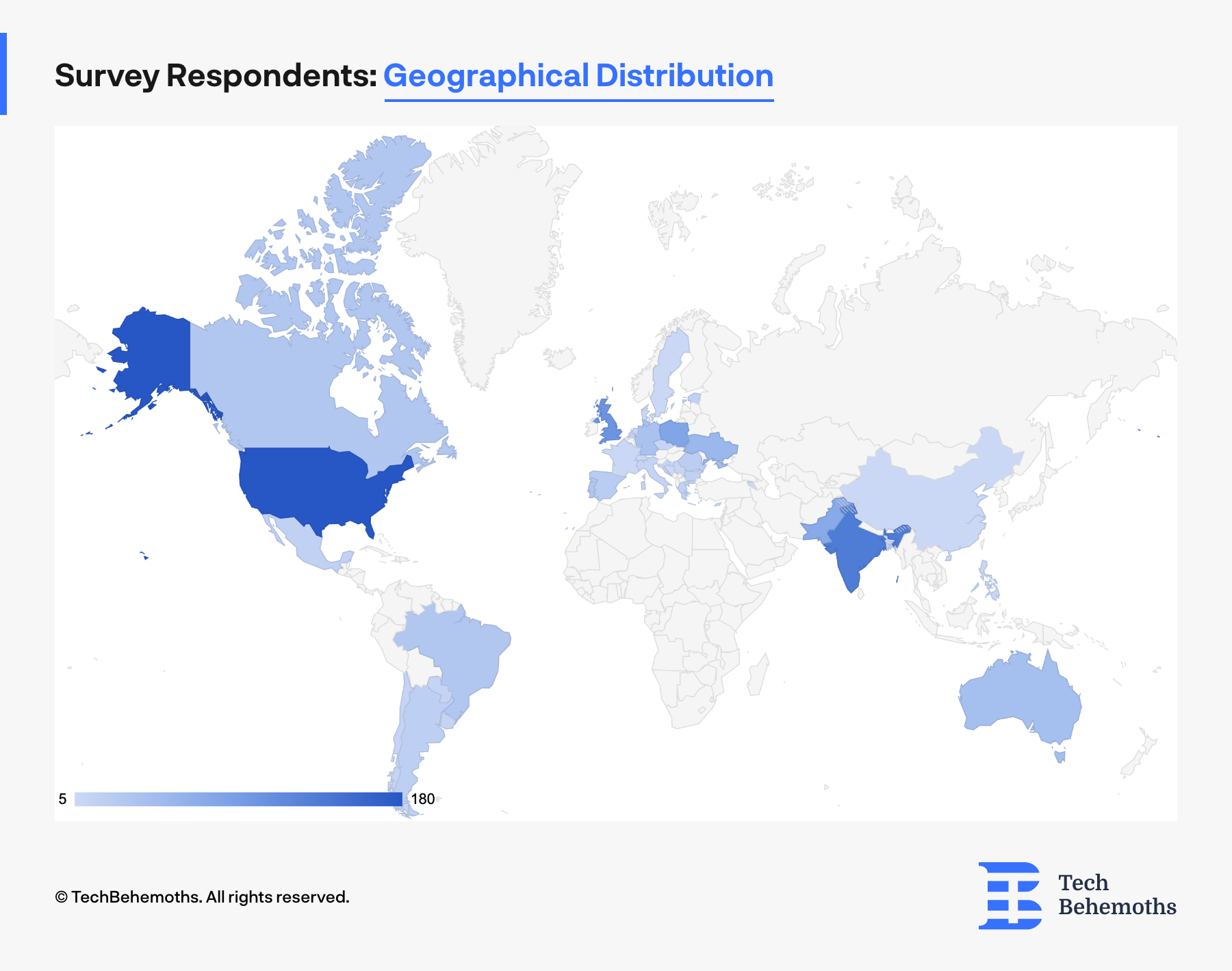
Survey Respondents - Company Size
Regarding the company size that survey respondents represent, the distribution is almost equally split between the four size groups and the results are as follows:
-
Respondents coming from companies with 2-9 team members - 30.09%
-
Respondents coming from companies with 10-20 team members - 21%
-
Respondents coming from companies with 20-50 team members - 20%
-
Respondents coming from companies with 50+ team members - 28.7%
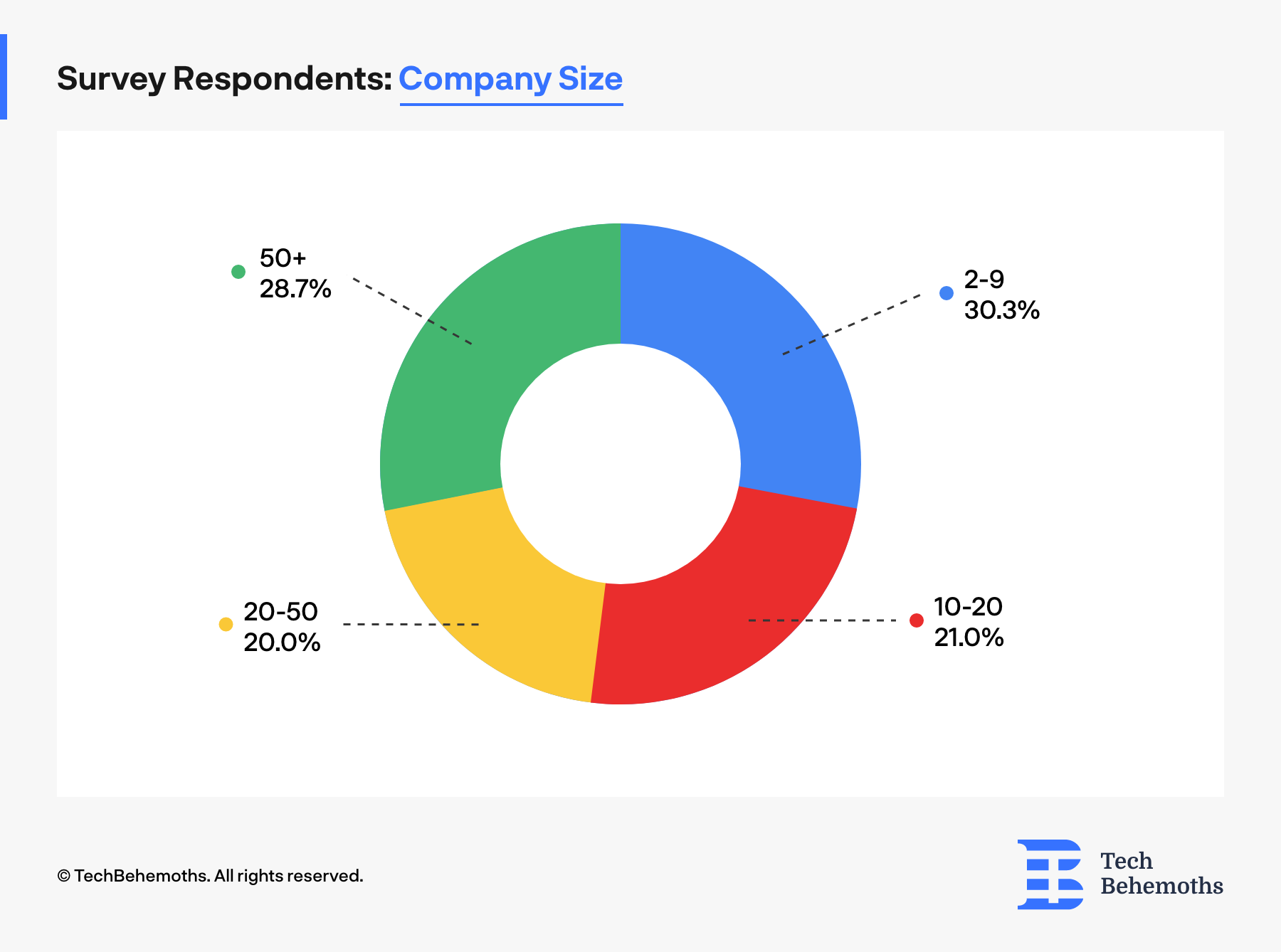
How Familiar Are IT Companies With Web3 Concepts and Terms?
Web3 is not defined in exact terms of how it will look like and what it is, the reason for which it is related and assumed to be connected with a series of terms - most of them related to blockchain, artificial intelligence and other emerging technologies and trending topics.
The first question the survey respondents were asked was meant to identify how familiar IT companies are with these terms - hence determining the answer quality. At the same time, the entire spectrum of terms have a different level of penetration in professional circles, companies, and countries underlining one more time the need to measure which terms are clear enough for everybody to understand.
When survey respondents were asked Which of the following terms are you familiar with? The results are as follows:
-
Web2 is the most commonly known term in IT companies, gathering 87.2% of responses.
-
AI or artificial intelligence is the second most known term by respondents - 86.2% of respondents answered they know what it means.
-
Web3 closes the top 3 most known terms, having an 82.1% rate from the total of respondents.
At the other end of the spectrum, Decentralization is the term IT companies are least familiar with and gathering only 64.8% of responses.
In the chart below you can find the full results for this question
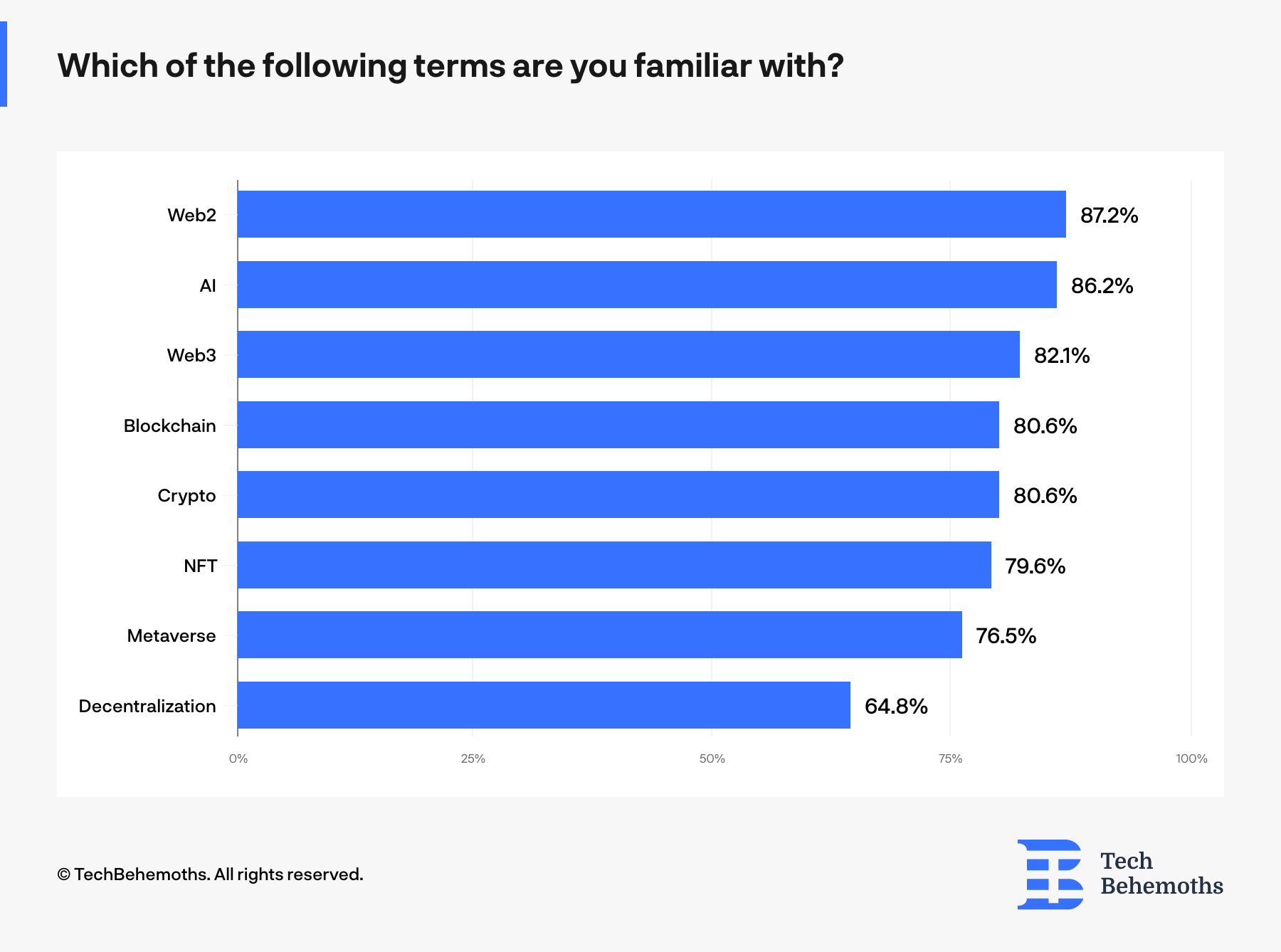
Social Media Is Web2’s Most Engaging Feature
Starting from the point that Web2 is the most common term among IT companies’ professionals, during the survey the respondents were asked to answer which Web2 feature their company is most engaged in.
As the heading states, IT companies use Social Media more than any other feature that belongs to the past and the current web - Web2:
-
74% of the respondents declared that their company is currently using Social Media more than other Web2 features
-
66% of the respondents answered that Software APIs are what their companies currently use most
-
Mobile Applications are the third most popular Web2 feature IT companies are currently using with 59% of responses
-
58% of respondents answered that SaaS is the Web2 feature their companies are most engaged in
The least popular Web2 features among IT companies proved to be Wikis and Podcasts with 17% and 24% of companies actively using them.
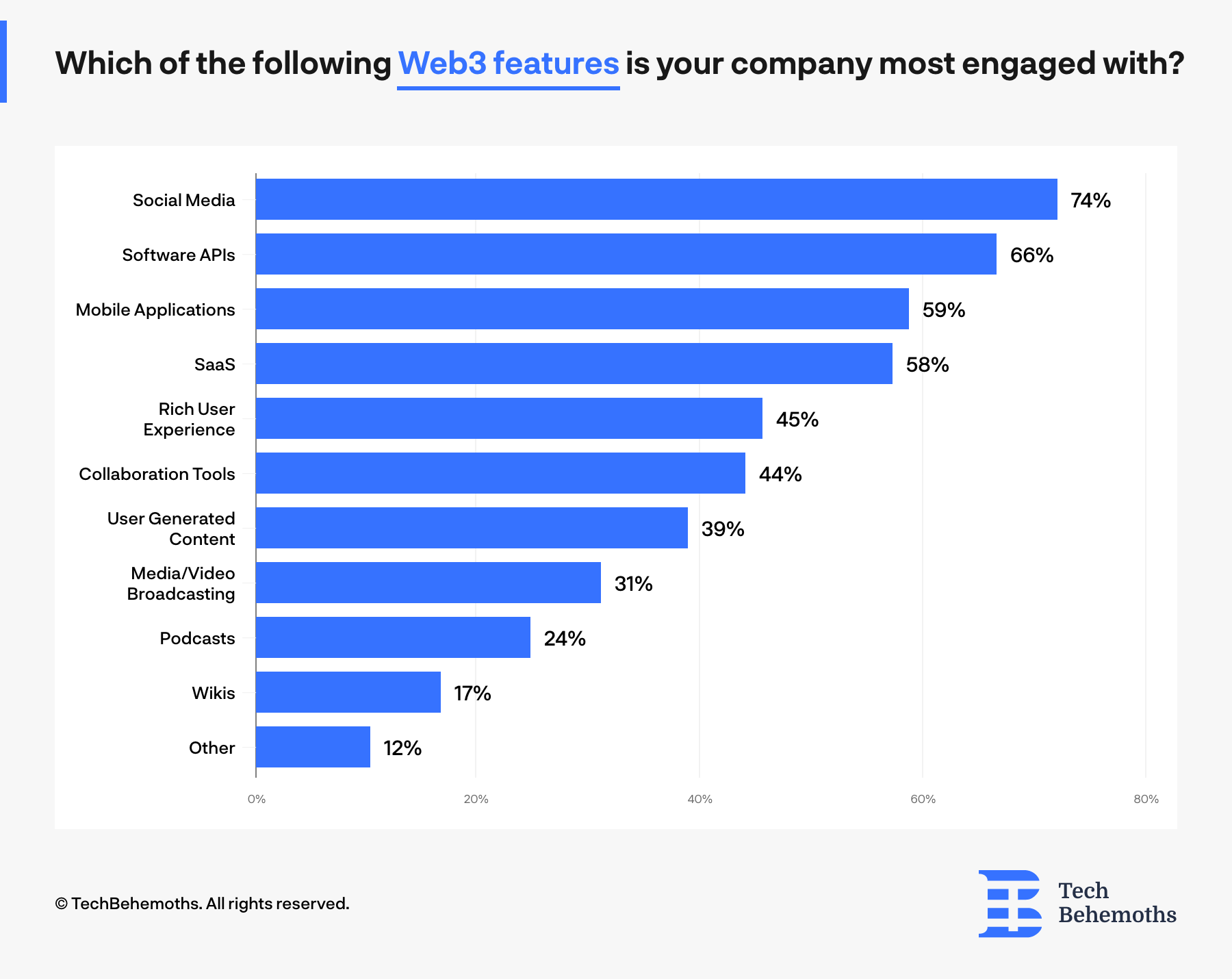
Information & Data Ownership - The Most Impactful Feature of Web3
Looking at the Web3 perspectives and features to come, IT Companies consider that Information and Data Ownership is what they will be affected most, but not necessarily in a positive or negative way.
During the survey, the respondents were asked to select the most impactful Web3 features that are yet to come from a list. Also, important to mention that they were able to tick multiple answers.
In this way 62.2% of respondents declared that information and data ownership will be the most impactful feature of Web3, while data and privacy connection will be the second most impactful feature, gathering 60.70% of responses.
The least impactful feature of Web3 according to IT companies is unregulated and free access - where only 21.9% of respondents consider it as a top Web3 feature.
Web decentralization is somewhere in the middle, with 55.6% of respondents declaring it will count among the most impactful Web3 features.
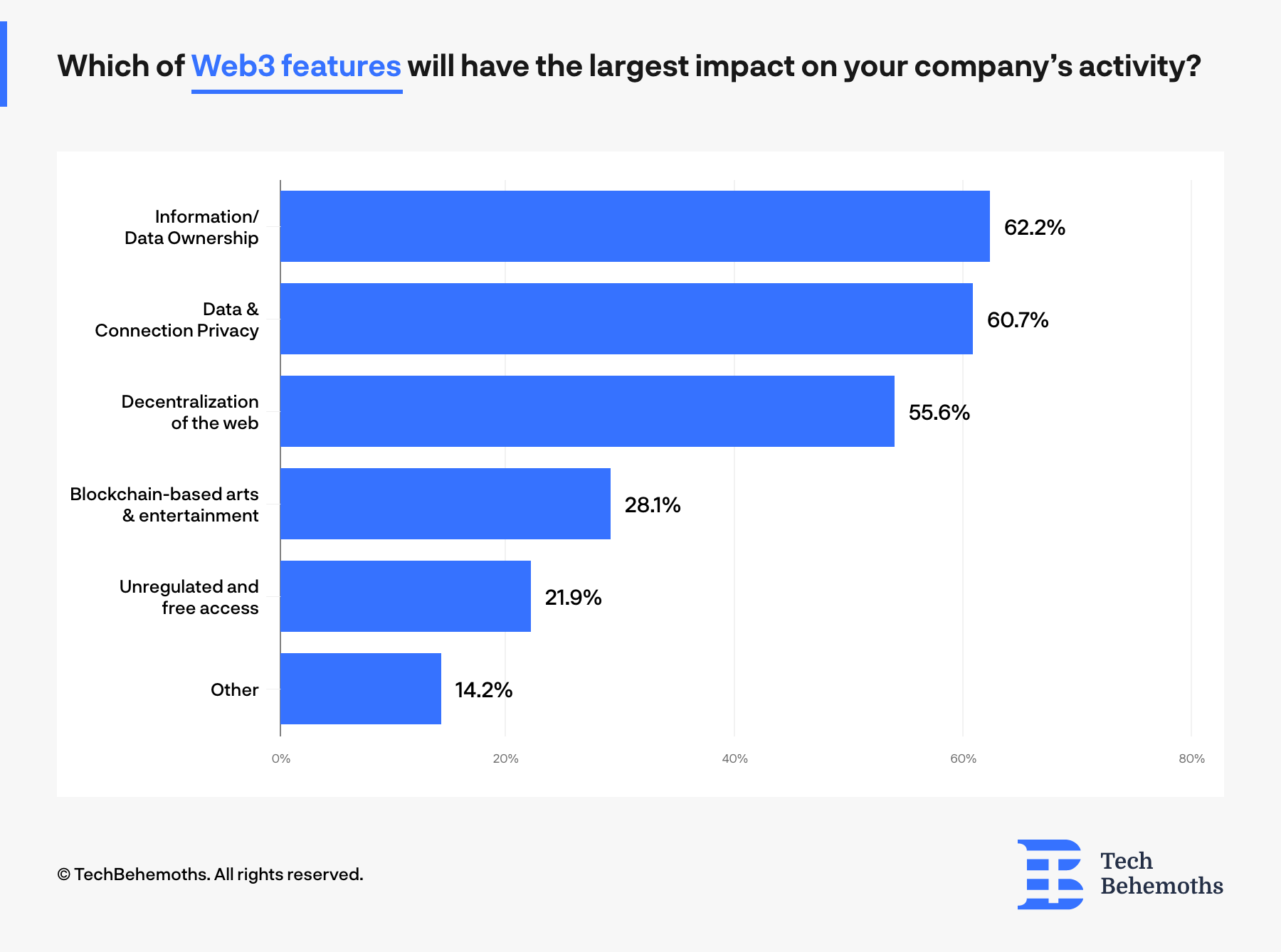
24.5% of IT Companies Already Adopted Decentralized Technologies in Their Services
While some Web3 features may have more impact than others, especially when it comes to IT companies - this doesn’t mean that a good part of them aren’t already adopting decentralized technologies in their service and product offerings.
As such, the survey shows that 24.5% of participating IT companies in the survey already work with decentralized technologies, while other 19.4% of IT companies already took a decision to do this, and are planning to incorporate decentralized technologies in their processes, services, and products.
Nonetheless, the percentage of undecided ones is still above a quarter - 27.6% of IT companies still didn’t decide (yet) if they will be adopting decentralized technologies in their services.
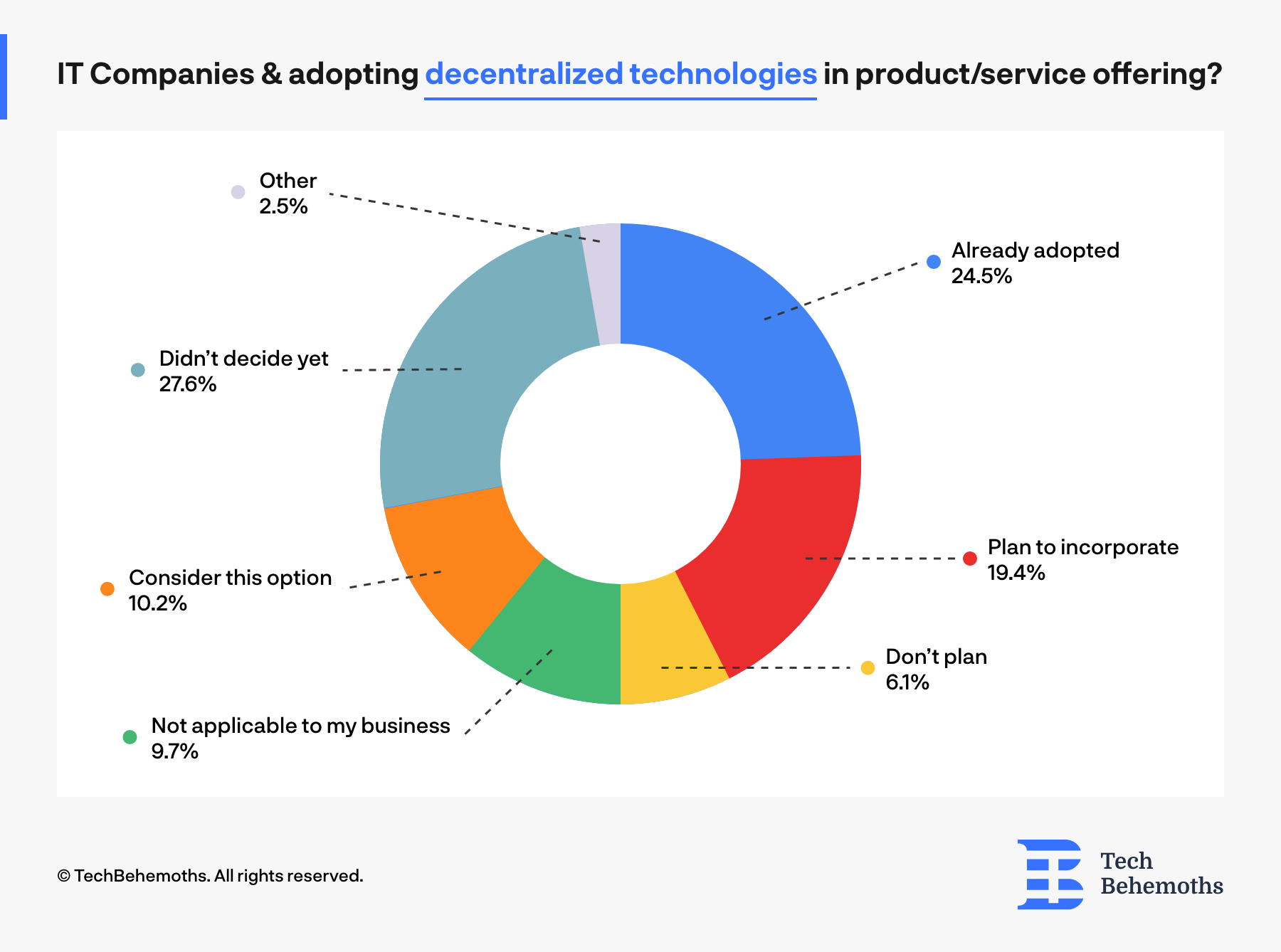
26.5% of IT Companies Already Face Web3-Related Challenges
While a quarter of IT companies already adopted decentralized technologies, survey respondents also declared that to some extent their activity is affected by different Web3 features and aspects.
Considering that Web3 didn’t yet gain mass adoption, companies that already implemented decentralized technologies are the most affected. However, the other side of the story may turn out to be that companies that didn’t implement decentralized technologies could face unfair competition.
This way or another, when asked if their company face challenges related to web3, IT representatives answered in the following way:
-
26.5% are facing challenges related to Web3
-
43.4% don’t face any challenges related to Web3
-
30.1% of IT companies are yet unaware if they do or don’t face any challenges related to Web3
There are many aspects and interpretations on this topic, and, in time the answers may be different based on how IT companies decide to act further.
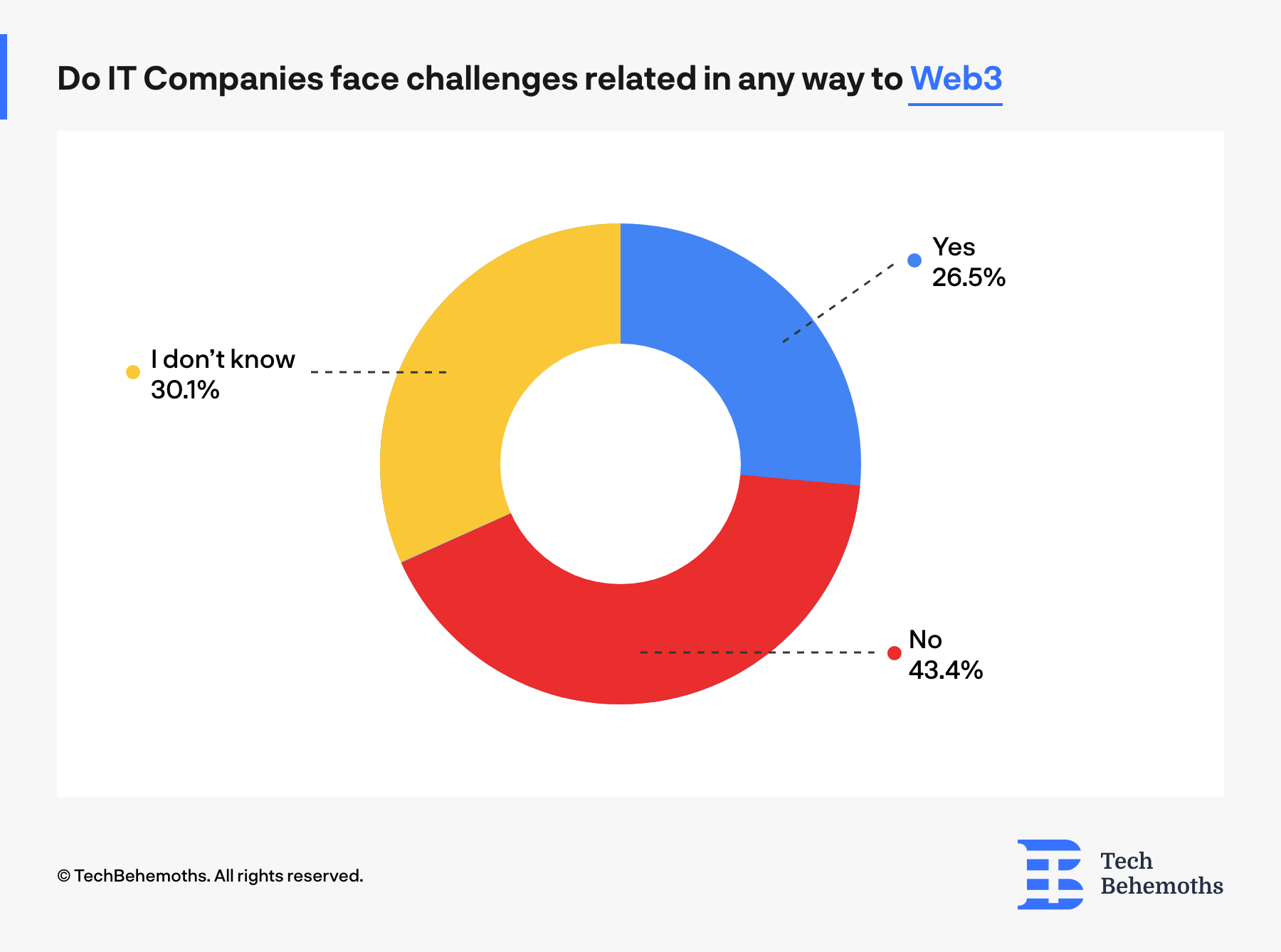
54% of IT Companies Predict Universal Benefits for Internet Users with Web3 Technology
With all its potential features, Web3 is most likely to satisfy all internet users, rather than separate entities - the survey shows. Among the reasons behind this result may be that Web3 features such as greater security, better UX and improved transparency will be appreciated by everyone.
However, if we break down the general group of all internet users, IT companies consider that the biggest beneficiaries from Web3 would be enterprises and corporations, followed by small businesses, and artists and musicians. According to IT companies, the least favored group by Web3 features would be governments and institutions.
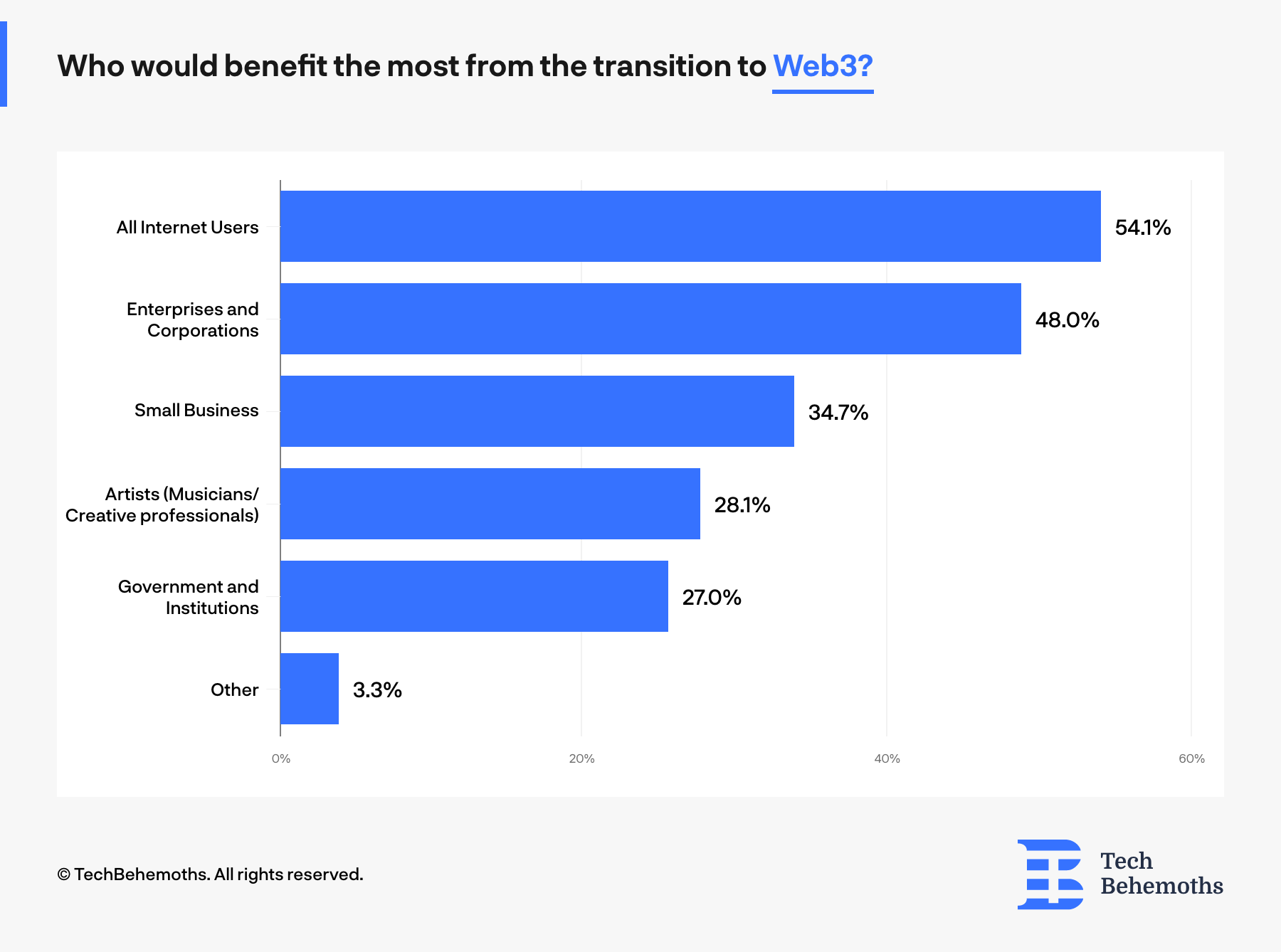
On this topic, Andrei Usatii, Rocket Minds Co-Founder stated that
Web3 could lead to greater autonomy for the public, enhanced transparency within existing systems, and more democracy overall. Additionally, with advances in digital identity management solutions, individuals will be empowered to own their data and make decisions independently or collectively - unchaining them from the traditional centralized institutions.
In the Next 5 Years, Web3 Might Gain Mass Adoption - Tech Leaders Say
While there’s not a clear definition of Web3, most IT companies consider it could gain mass adoption in the next 5 years. Not sure yet if this will happen with, or without the Metaverse as an element of Web3, but some of the already existing and implemented Web3 features on a smaller scale - such as Digital Arts for example would have a secured spot in getting mass adoption.
According to the survey results, when asked about when web3 will get mass adoption 19.4% of the respondents answered that it could be in the next 2 years, while other 35.2% of respondents consider that web3 could be adopted in the next 5 years.
More skeptical were 33.2% of IT companies by answering that we may see Web3 massively adopted between 5-10 years, while for 10+ years answered 5.6% of survey respondents.
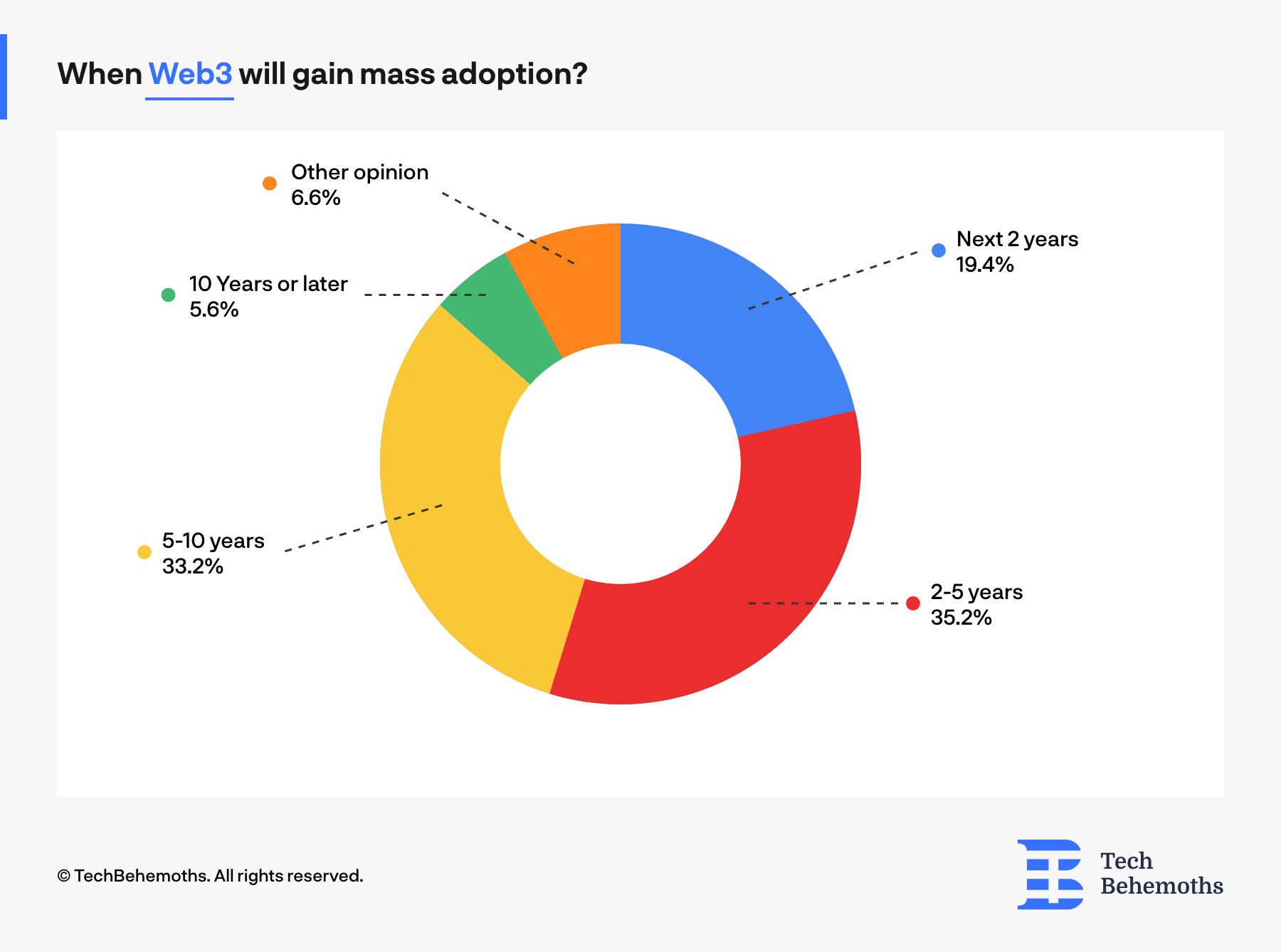
Decentralized Technologies Have a Moderate to Strong Impact Over How IT Companies Operate & Communicate
Web3 elements like the Metaverse, data ownership, and secure connection could have a certain impact on how IT companies operate and communicate. During the survey, the participants were asked to determine on a scale of 1 to 5 how impactful decentralized technologies will be to their work environments.
The survey respondents consider that decentralized technologies will definitely have an impact.
-
40.2% of respondents appreciated as a moderate impact
-
37.2% of respondents consider that decentralization will have a strong impact
-
14.3% of respondents think that decentralization will totally change the way IT companies operate and communicate.
At the same time, only 1.5% of respondents consider that decentralization will have no impact on how IT companies operate and communicate, and 6.1% of respondents think that the impact will be insignificant.
Considering the answers above, it is important to note that some IT companies may be affected more than others by decentralized technologies - depending on the service offering type, field of activity, and target audience.
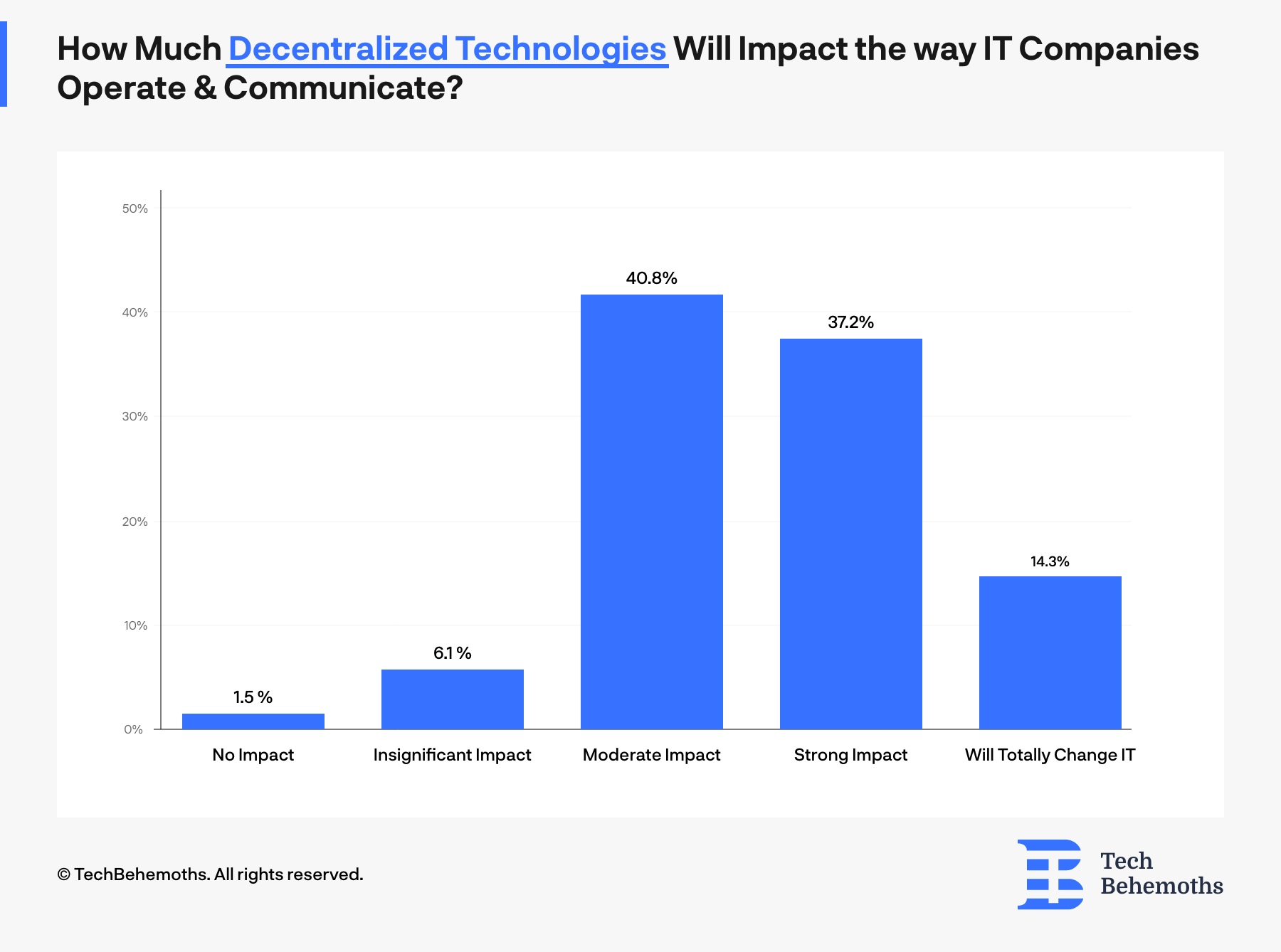
ChatGPT - The App IT Companies Are Most Excited To Use
New-generation apps are some of the most important features of Web3 and are also the place where tech progress is highlighted. It’s no wonder that (yet) the most revolutionary app in terms of AI content generation leads the chart of the most popular digital product among IT companies.
When asked What existing or new app are you most excited about? IT professionals answered that by far ChatGPT with a popularity rate of 64.1%. And the surprise doesn’t stop here - two other Microsoft products are in the top 5, according to the survey. LinkedIn was favored over other apps by 6.1% of respondents and Microsoft 365 was also chosen by 1.4% of the respondents.
Zoom and Salesforce were at the other end of the spectrum, being chosen by 0.9% of respondents each.
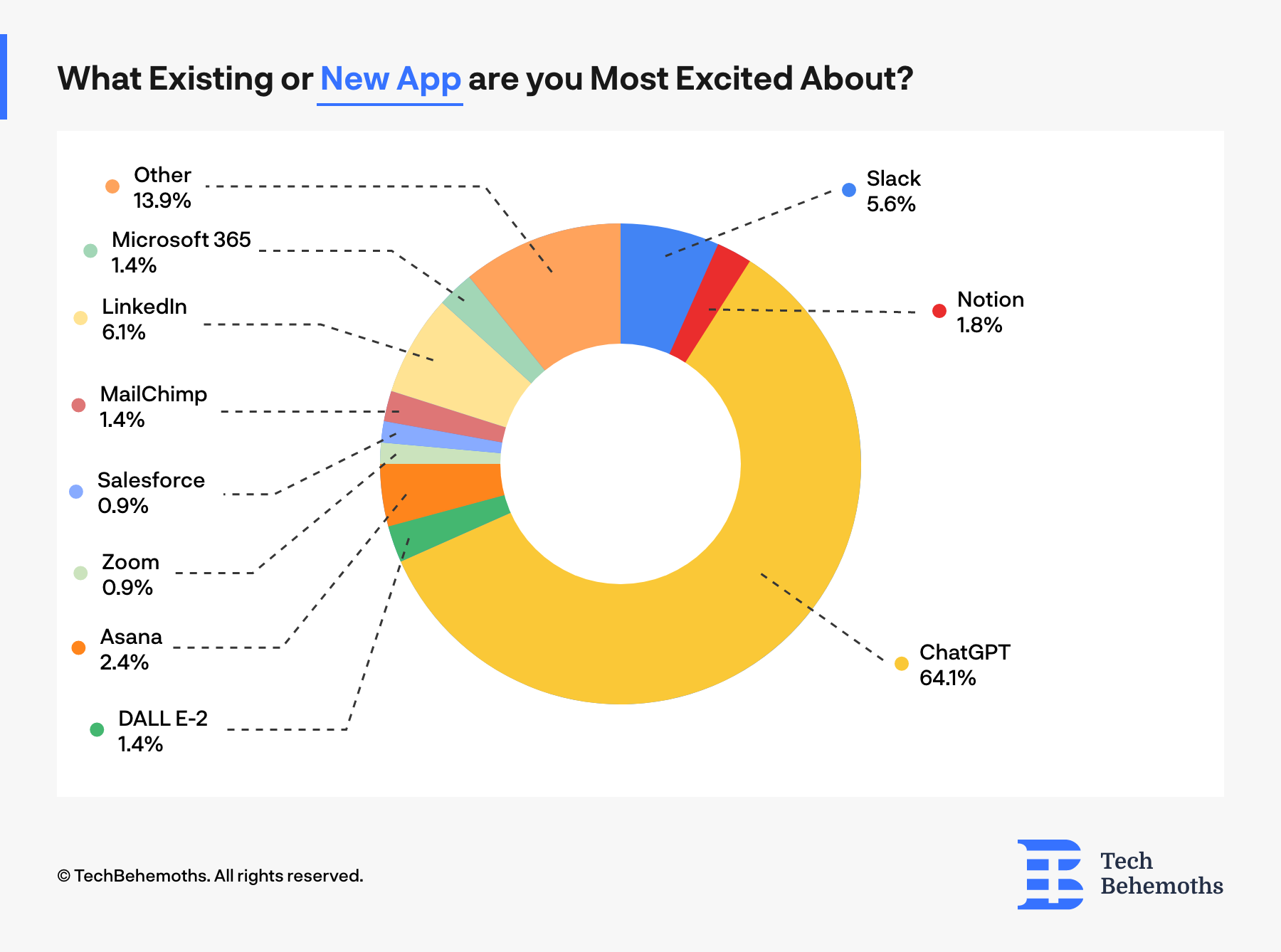
How Web3 Will Impact Traditional Institutions?
Besides small and medium businesses, which will definitely be touched by the mass adoption of Web3, governments, and corporations will find it most difficult to adapt. The main reason - a lot of processes to change, from communication to operational, data sharing, new working environments, and more.
Tech Leaders have different opinions on how Web3 will impact centralized institutions, especially considering that Web3 to some extent means decentralization. Generally, the opinion is divided in 3 categories:
-
The importance of centralized institutions will be diminished in web3
-
Centralized institutions will transform their processes accordingly
-
It’s too early to draw conclusions on this subject as Web3 has not been shaped yet by features and apps.
Walter Steelman, the CEO of 11 Marketing+Desgin told that To date, it(Web3) appears to be a dream that is just beyond our reach.
At the same time, Romy Frederick - Business Developer at iLeaf Solutions thinks that Web3 could bring benefic transformations, but it’s too early for such predictions, as well saying that
Web3 technology has the potential to greatly disrupt traditional centralized institutions such as governments and corporations, by enabling more decentralized and democratic systems. This could lead to increased transparency, reduced corruption, and improved accountability, as well as giving individuals more control over their personal data and assets. However, the full extent of this impact remains to be seen, as Web3 is still in its early stages of development and adoption.
The same opinion is shared by Ashwin Thapliyal, that stated Web 3 may come with…]data concerns and maintaining regulations. It will be a very tricky case-by-case scenario. Too early to say right now
On the same note, Jeane Sumner, WebsiteHQ CEO comes with the following idea -
While Web3 is still in its early stages of development and adoption it's easy to imagine if it will have the potential to disrupt these more traditional institutions because of more transparency and accountability.
Yet, there are also tech leaders that consider Web3 as a transforming opportunity for traditional institutions, rather than a forcing circumstance. Pablo Pfister, 5w155 SA CEO thinks that
“Governmental institutions can become more efficient, and have information accessible more easily. Many corporations gain most of their profits from sitting in between the final user and the service, which can be radically changed by allowing direct control and delegating only part of the access to such corporations.”
In contrast, Aliaksandr Kot, Exposit Chief Commercial Officer states that
I don't believe the government can use WEB 3 advantages in terms of decentralized technologies at all, having a fear of losing access to this data or someone can have it unauthorized. Opposite we see how conservative governments are trying to isolate all their internal data and protect it against leaks.
Serge Lavrinchuck, Wild.codes founder, considers that Web3 could lead to a shift away from traditional centralized institutions by providing alternative systems for exchanging value, accessing services, and protecting personal data. For example, Web3 technologies like blockchain could allow individuals to control their own financial assets, rather than relying on banks. This could lead to new forms of social organization and more equitable distribution of wealth and power.
The most skeptical opinion among tech leaders within this survey comes from Brazil, where Leticia Mendonca, Pengreen Design Founder stated the following:
It's a threat for them(centralized institutions) because they lose control of the people, and I would include banks there too, the ones that fear the most. They are already rushing to have web3 incorporated into their process, but it's not decentralized. An example is Ripple, part of web3 but still a centralized ecosystem.
It may be indeed that centralized/traditional institutions are trying to transform Web3 into a centralized concept before it’s launched, however, this remains a theory until proven the opposite.
Survey Conclusions
In conclusion, the survey results suggest that the transformation from Web2 to Web3 is a topic of great interest and importance to IT companies. While some respondents see Web3 as a dream that is currently beyond their reach, others recognize its potential to disrupt traditional centralized institutions such as governments and corporations, leading to greater transparency, reduced corruption, and improved accountability.
However, the survey also indicates that there are concerns about data and regulatory issues, which will need to be carefully considered on a case-by-case basis.
Despite the challenges, many respondents believe that Web3 has the potential to enable more efficient and accessible government institutions and empower individuals by giving them more control over their personal data and assets.
Overall, the survey suggests that while Web3 is still in its early stages of development and adoption, its potential impact is significant, and it is a topic that will continue to be closely monitored by IT companies.
Partner Companies
The survey was not limited to any geographical region or country and its main target was the global community of IT companies and web agencies that specialized in web development services. As such, survey respondents come from 988 different companies located in 35 countries across the globe. On this occasion, TechBehemoths is proudly announcing and crediting the list of partner companies that helped spreading the word and gathering answers for this survey.
- .wrk ,Portugal -
- 11 Marketing +Design, United States
- 3dev.io, Poland
- 5w155 SA, Switzerland
- 84EM, United States
- ABSYZ Software Consulting, India
- Acodez IT Solutions, India
- Adzglobe, India
- Agência Divulgar Meu Negócio, Brazil
- Agencia SEO & Marketing Digital René Rodríguez, Spain
- AHVCS, India
- Ai9, Bangladesh
- Aimprosoft, Ukraine
- Amygdal, Bosnia and Herzegovina
- AMZ DOC INC., Pakistan
- Ancient, Mexico
- Andromeda Group, Portugal
- Antologic, Poland
- ASCMI LDA Portugal
- Astha Technology Solutions Private Limited, India
- *instinctools, Germany
- AUBERT-DUMOND SAS, France
- Authorselvi, India
- Avail Advertising Pvt. ltd., India
- B1 Studio, Romania
- BacancyTechnology, India
- BDeveloper, India
- BEON.tech, Argentina
- Beth Media, Germany
- Betlace, Ukraine
- Bluelupin Technologies, India
- BluWebMedia IT Services Pvt Ltd, India
- Boa Imagem, Brazil
- Boylen +, Australia
- Buzzvel, Portugal
- Byteout Software, United States
- CBETTER, India
- Bigiltoks, India and UK
- Ciphers Digital Marketing, United States
- Click Leaders, Poland
- Codefia, Poland
- CodeInfluencer IT Solution, India
- Concise Software, Poland
- Cosmico Studios, USA
- CryptoApe, India
- Cubet Techno Labs, India
- DAC.digital, Poland
- David Martin Design, United States
- Decipher Zone, India
- DENEVY s.r.o., Czech Republic
- Deqode, India
- Desarrollalab, Mexico
- DevRain, Ukraine
- Dexoc Solutions, India
- Dezital, Pakistan
- DICEUS, Lithuania
- Digital Dividend, Sweden, Pakistan
- Digitalhound Ltd, United Kingdom
- DNAMIC, Costa Rica
- Doomel Social Influencer Marketing, Brazil
- dot n pixel, Poland
- Dtech Studio, India
- dunp scpl, Italy
- Eagle IT Solutions, North Macedonia
- Edvantis, Germany
- eQuest Solutions, India
- Espresso Labs, Brazil
- Exadel, United States
- Exemplifi, United States
- Exposit, Poland
- FBIP Website Designing And Development Company, India
- Feligrat Global Solutions, India
- Fingerprintscreative, India
- Five Jars, United States, Ukraine, Serbia
- Fively, Poland
- Flatirons Development, United States
- Gigalabs, Pakistan
- Globe Group S.A., Poland
- GrayCell Technologies Exports, India
- Green Duck Research, Ukraine
- Groovy Technoweb PVT LTD, Australia, US, Germany
- Hello International Marketing Solutions, Pakistan
- Horizon Communications, Serbia
- hulo.dev, Ukraine
- HydraDev, Portugal
- Hydralab, Armenia
- OmniShop, United States
- ICODA, Poland
- iLeaf Solutions Pvt Ltd, India
- Infinkey Solutions Private Limited, Pakistan
- Influence IT Consulting Pty LTd, Australia
- Inovatis Group SA, Paraguay
- Inovector, Moldova
- IT Craft YSA GmbH, Germany
- Jeff Social Marketing, Canada
- JohnCube, Poland
- Ki Teknology, Chile
- Koffein, Chile
- Lab3Web, Greece
- LeanyLabs, Estonia
- LiftUp, Romania, United States
- Locastic, Croatia
- LoopStudio, Uruguay
- Maasro Technologies, India
- Major Tom, Canada, United States
- Maksol Digital Solutions, Pakistan, United Kingdom
- Mbicycle, USA
- Mentores Design, Brazil
- Michaela Bartoňová, Czechia
- MiRo Comunicazione Srl, Italy
- Mobiteam GmbH, Germany
- Mode Effect, United States
- MRM, Spain
- MSSOFTPC, India
- Muse Marketing Group Inc., Canada
- MWIMMERDESIGN, Germany
- Mythology Labs, Uruguay
- NCompass Ltd, UK
- Neo Vision, Romania
- NERDZ LAB, Ukraine
- NE Marketing & Efficiency, United States
- Nokto Studios SRL, Romania
- NOVACOMP, Costa Rica
- Omnisoftex Inc, Pakistan
- OnGraph Technologies Pvt Ltd, India
- OptiView 360, United States
- Ordinax Private Limited, India
- Pace Social Media, United States
- Pengreen Design, Brazil
- Pixelmatters, Portugal
- Plan A/B, Spain
- PowerFlite Communications LLC, United States
- Presitely, Bulgaria
- PRO Media 66, UK
- Qarbon IT, Poland
- Quadone, India
- Qualifast, Bulgaria
- Ralabs, Tallinn
- Real Wisconsin Website Design, America
- ROC.PH, The Philippines
- Rocket Minds, Netherlands
- Saint Rollox Digital, Australia
- Select Pakistan, Pakistan
- SEO Expert Gold Coast, Australia
- SEOLHR, Pakistan
- Shugert Marketing, Spain, Mexico, United States
- sitecentre, Australia
- SJInnovation, USA
- Skynet Technologies, United States
- Soft CodeOn, Pakistan
- Direction Biz, Mumbai
- We Define Apps
- Solar Digital, Ukraine
- SolidBrain, Ukraine, Poland, USA
- Solidstudio sp. z o.o., Poland
- Spyhunter IT Solution Team ledarIndian
- Square63, Pakistan
- Still Up Marketing, Canada
- SuburbanBuzz.com LLC, United States
- SVIK IT SOLUTION & SERVICES, Cyprus
- SystemSeed, United States
- Talk Out Loud Inc, United States
- Teamarcs technologies, India
- TechDoodles, India
- TechMagic, Ukraine
- TEQTOP, India
- The Belford Group, United States
- The Digital Marketing People, Canada
- The Hotel SEO Agency, Greece
- The SEO Works, UK
- The Works, Australia
- Titan Blue Australia, Australia
- Trendz Web Solution, India
- Trinomix Technologies, India
- Triple Innovations, Croatia
- Tu Comercio Web, Argentina
- TUXDI Digital Agency, Argentina
- Twinning Pros, United States
- URO Software and Design Limited
- Veepal IT Services Pvt. Ltd., India
- Velvetech LLC, USA
- Vinsys, India
- NickFrance Design, United States
- webisoft, Canada
- Webnet Pakistan Pvt Ltd, Pakistan
- WebNexta, Cayman Islands
- Weboo, Greece
- Website HQ, United States
- Wild.codes, Estonia Ukraine
- Wollow, Bulgaria
- Xeven Solutions, Pakistan, UK
- Xfive, Poland
- XOOR, Argentina
- Yes I Web, United States
- Yield Interactive, India
- ZH IT SOLUTIONS, United States